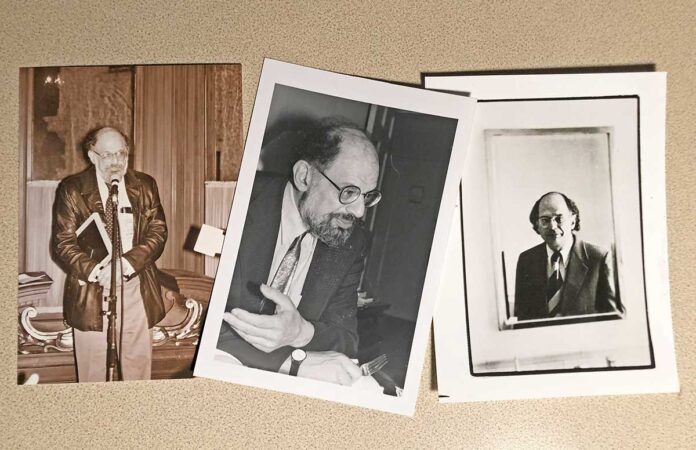
Allen Ginsberg, the celebrated poet, counterculture icon, and out gay man, died 25 years ago, on April 5, 1997.
In a recent interview, the musician Patti Smith described Ginsberg’s final days. Confined to bed, she recalled, he listened to Big Mama Thornton while the composer Philip Glass and the poet’s lifelong companion, Peter Orlovsky, kept vigil.
According to Smith, the experience wasn’t sad: “It was more like an honor to sit by the side of a great friend but also one of our greatest poets.”
Ginsberg’s work is worth revisiting this National Poetry Month, because it’s a defiant, life-affirming contrast to “Don’t Say Gay” bills and book bans.
“Howl,” Ginsberg’s most famous poem, is a scathing indictment of conformity and materialism. It begins, “I saw the best minds of my generation destroyed by madness, starving hysterical naked.” The poem’s opening section is Ginsberg’s catalog of friends and acquaintances whose lives were stunted by Eisenhower-era America, the ones “who chained themselves to subways” or “who copulated ecstatic and insatiate.” The repetition reinforces his criticism and lends a kind of Biblical dignity to these marginalized people.
The poem’s second section is Ginsberg’s condemnation of Moloch, an ancient pagan god who devoured children. As he puts it, “Moloch whose mind is pure machinery! Moloch whose blood is running money!”
A tone of righteous indignation suffuses “Howl,” but Ginsberg was equally capable of genuine pathos. “Sunflower Sutra” describes a hungover day spent with Jack Kerouac. Wandering along the railroad tracks, Kerouac spots the dead stalk of a sunflower among the detritus. Ginsberg is overcome; it’s his first sunflower, even if it is dead. Ginsberg grasps the stalk like a knight-errant holding his lance. He quickly stops clowning, though. Even desiccated and drooping, the sunflower’s beauty moves him. “We’re not our skin of grime, we’re not dread bleak dusty imageless locomotives, we’re golden sunflowers inside, blessed by our own seed & hairy naked accomplishment,” he writes.
Ginsberg is also funny. In “A Supermarket in California,” the poet goes “shopping for images,” only to encounter his poetic forefather: “I saw you, Walt Whitman, childless, lonely old grubber, poking among the meats in the refrigerator and eyeing the grocery boys.” As the two men walk each aisle, Ginsberg wonders where they’ll go when the store closes. For a stroll? Maybe cruising? “Which way does your beard point tonight?” he asks.
Ginsberg’s candor about being gay is one of the pleasures of his work; some of his poems pulse with desire for men. “The Green Automobile,” for example, is a love poem to Neal Cassady. By all accounts, this former juvenile delinquent exuded an animal attraction to women and men. But unlike Kerouac’s coy depiction of Cassady’s appeal in “On the Road,” Ginsberg is frank.
He imagines rescuing his “old companion” from his wife and kids, then racing into the mountains “laughing in each other’s arms.” Later, “after old agony,” the pair embark on a series of adventures. Significantly, Ginsberg imagines them meeting again years later, as old men. It’s a tender, loving gesture that lifts Cassady out of a perpetual state of adolescence. As Ginsberg puts it, “Neal, we’ll be real heroes now / in a war between our cocks and time.”
Ginsberg’s plain talk about being gay is related to another important aspect of his work: He’s a political poet. The 1956 poem “America” is an off-kilter state of the union noteworthy for its bluntness. “Go fuck yourself with your atom bomb,” Ginsberg declares. The poem also memorializes the Old Left’s heroes, like Scott Nearing, and its martyrs, including Sacco and Vanzetti.
In “Wichita Vortex Sutra,” a complex antiwar poem from 1966, Ginsberg’s goal is ending the Vietnam War via his verse. Ostensibly the chronicle of a bus trip to Kansas where he will give a reading, it begins with a welter of disjointed images. Ginsberg records the billboards and street signs passing by, as well as snippets of radio broadcasts and newspaper headlines. At first, these disconnected phrases seem like gibberish. But Ginsberg’s ire eventually reveals itself: the deadly bureaucratese of America’s ruling elite. “The war is language / language abused,” he writes.
Perhaps, Ginsberg imagines, a poet can restore peace. He knows it’s a thankless task, unlikely to find much support in Middle America. But, as he puts it, “spoken lonesomeness is Prophecy.” So when he writes, “I lift my voice aloud, / make Mantra of American language now, / I here declare the end of the War!” readers must confront the fact that Ginsberg’s declaration is no more absurd than, say, “US Army recruiting service sign Careers With A Future.”
Of course, “Wichita Vortex Sutra” didn’t end Vietnam. But in the current culture war, Ginsberg may still be of help. As he once wrote, “America I’m putting my queer shoulder to the wheel.”
